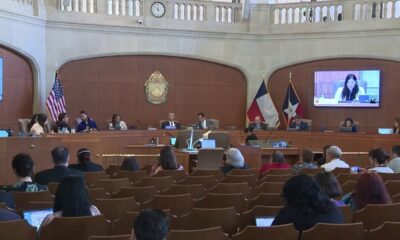News from the South - Missouri News Feed
Few changes made in $48B state budget during Missouri House debate
by Rudi Keller, Missouri Independent
April 1, 2025
Democrats failed on Tuesday to win major changes in the $47.9 billion state budget plan during Missouri House debate, suffering defeat on proposals to shift money to the school funding formula and increase payments to child care providers.
Few Republicans broke ranks with party leadership on those or any other proposal put forth by Democrats, leading one lawmaker to wonder out loud why the chamber was bothering with debates.
“Why take us through this dog and pony show?” said state Rep. Marlene Terry, a Democrat from Bellefontaine Neighbors.
Need to get in touch?
Have a news tip?
Democrats did win a few minor changes to the budget, but the biggest difference between the plan approved in the House Budget Committee last month and the bills given first round approval Monday were made by Republican amendments. In the Medicaid program, for example, the House cut about $50 million in general revenue matches to federal funds, arguing the funds were not needed because enrollment is not meeting earlier expectations.
A final series of votes on the 13 spending bills funding state operations will be held Thursday to send the budget to the state Senate. Three more bills, allocating money to capital improvements, are awaiting action in the House Budget Committee.
While the House worked on the budget, the state Senate debated a bill exempting long-term capital gains from state income tax. Senate Appropriations Committee Chairman Lincoln Hough, a Republican from Springfield, said during debate that federal budget cuts could force Missouri to spend more state tax dollars on Medicaid.
Hough questioned whether a tax cut of about $335 million in the coming fiscal year was prudent. If the federal match rate for low-income adults added to the rolls since 2021 is changed from 90% to 80%, Hough said, it would require $300 million in additional general revenue.
“That is a fairly scary financial forecast,” Hough said.
Hough has said he intends to use cash balances to fully fund the foundation formula and that he will support the increase for child care providers.
The possibility of cuts in national spending — federal funds provide about 45% of Missouri’s budget — was also raised in the House.
“Our entire budget will be blown to bits if we lose federal funding,” said state Rep. Stephanie Hein, a Democrat from Springfield.
The state had a substantial balance of $3.8 billion in the general revenue fund as of Monday, down from historic high of about $5.7 billion set in 2023. The budget for the coming year anticipates leaving about $1.9 billion unspent.
Missouri received $13.4 billion in general revenue in the year that ended June 30 and the budget anticipates $13.5 billion for the coming fiscal year.
The budget plan debated by the House cuts almost $800 million in general revenue and $2.1 billion overall less than the operating budget proposed by Gov. Mike Kehoe in January. The spending proposal achieves those savings in part by cutting appropriations that had no funding available, by reducing Medicaid to match expected enrollment and by slicing Kehoe’s plan for state employee pay raises in half.
Instead of a raise of 1% for every two years in a state job, capped at 10%, the House pay plan is to provide a raise of 1% for every two years in a state job but capped at 5%.
Additions to the budget proposed by Kehoe include 105 earmarked items, including nine added Monday, with a total cost of $170 million. The House also added $28 million that will be distributed to state colleges and universities for deferred building maintenance.
The two biggest clashes of the day bookended the five-hour debate.
Only one Republican joined Democrats on a failed amendment to shift $50 million in general revenue from a tax credit program supporting private school tuition scholarships to the foundation formula.
Democrats argued that the budget shortchanges public schools by failing to meet the new state adequacy target, which is a measure of how much high-performing districts spend per student. The House plan allows for a state adequacy target of $6,760 per student instead of the $7,145 that resulted from the calculation mandated by state law.
To boost foundation formula funding, state Rep. Betsy Fogle, a Springfield Democrat, tried to strip out $50 million for the MOScholars program, which was supposed to be funded by donations tied to tax credits.
Too many of the private schools participating in the scholarship program won’t accept students with developmental disabilities or who won’t participate in religious instruction, Fogle said.
“I can’t think of anything more frustrating to me, personally, than my tax dollars going to a school that wouldn’t have educated me, that wouldn’t have educated a lot of people in this body,” she said.
Defending the set-aside for the scholarship program, Republicans said the influx of state cash will help hundreds more students.
“This is a historic investment in our children’s future, fostering flexibility around parental involvement and educational freedom for our kids,” said state Rep. Ben Baker, a Republican from Neosho.
While the budget plan accepted Kehoe’s proposal for scholarships, it did not include his $107 million plan for child care subsidies. The system for delivering payments has been plagued by mistakes and delays and some providers have closed as a result.
Hein sought to restore about $85 million of the cut.
“We have the opportunity to fix the situation and bring the state into compliance with federal rules,” Hein said. “We can stabilize the child care industry and help our workforce.”
Republicans, however, said the expense will have to be paid from general revenue in the future and it is too costly. The problems with the payment system are solved, said House Budget Committee Chairman Dirk Deaton, a Republican from Noel, and a change now could cause problems to resurface.
“Changing how you pay providers from attendance to enrollment is not just flipping a switch over at the Department of Elementary Secondary Education,” he said. “There are substantial software changes that have to be made.”
YOU MAKE OUR WORK POSSIBLE.
Missouri Independent is part of States Newsroom, a nonprofit news network supported by grants and a coalition of donors as a 501c(3) public charity. Missouri Independent maintains editorial independence. Contact Editor Jason Hancock for questions: info@missouriindependent.com.
The post Few changes made in $48B state budget during Missouri House debate appeared first on missouriindependent.com
News from the South - Missouri News Feed
St. Louis forecast: Flash flooding possible Friday, Saturday
SUMMARY: The St. Louis area is expecting heavy rainfall this weekend, with flash flooding possible on Friday and Saturday. Rivers, streams, and creeks are rising, creating dangerous conditions due to fast-moving currents. A flood watch is in effect, with 2-3 inches of rain expected, and some areas could receive up to 4 inches. The National Weather Service has issued a warning for the region, including the metro area. Additionally, severe storms continue in other parts of the country, with tornado warnings in Nashville. Next week will bring cooler, quieter weather, with possible freezing temperatures by Monday and Tuesday.

Heavy rain is likely to end the week with flooding concerns. By Sunday morning, 2 to 5 inches of rain is possible area-wide.
News from the South - Missouri News Feed
Preparing for hail damage as severe storms pass through St. Charles County
SUMMARY: Severe storms swept through St. Charles County, prompting concerns about hail damage. Justina Cornell reported live from Travers GMT Auto in O’Fallon, Missouri, where baseball-sized hail destroyed around 300 vehicles a year ago. This time, the dealership was spared, and the owner expressed gratitude. At around 3:15 p.m., skies quickly darkened, triggering automatic lights. Though conditions have since eased to overcast skies, areas like Possi may have suffered more severe damage. Eureka Fire officials deployed a crew, including off-duty responders, to assess the situation. Updates will be shared as information becomes available via KDKA.com and broadcast channels.

Severe storms passed through the St. Louis region on Wednesday. 5 On Your Side’s Justina Coronel has the latest from St. Charles County.
News from the South - Missouri News Feed
Trump to impose 10% base tariff on international imports, higher levies on some nations
by Ashley Murray, Missouri Independent
April 2, 2025
This story was updated at 6:55 p.m. EDT.
WASHINGTON — President Donald Trump rolled out sweeping “reciprocal” tariffs Wednesday on trading partners and allies across the globe.
Declaring that foreign trade practices have created a “national emergency,” the president unveiled a baseline 10% levy on all international imports, plus what he described as additional “kind” and “discounted” tariff rates that will increase but not match the rates other countries apply to American imports.
The levies will hit U.S. industries from agriculture to manufacturing to fashion.
The 10% universal tariffs become effective April 5, with higher levies set for April 9, according to Trump’s executive order. Trump’s remarks Wednesday about the start dates varied from the order’s language.
Trump is the first president to enact tariffs under the International Emergency Economic Powers Act — something he already did in March when slapping levies on China, Canada and Mexico over the production and smuggling of illicit fentanyl.
According to a table distributed at Trump’s speech, U.S. tariffs will reach 34% on imports from China, 46% on products from Vietnam and 20% on European Union imports, among other increases.
Canada and Mexico will not see additional tariffs on top of the already imposed 25% on goods (10% on energy and potash) not compliant with the United States-Mexico-Canada Agreement, or USMCA. All compliant goods can continue to enter the U.S. levy-free.
The new 34% duties on China are set to stack on top of older 20% tariffs, according to some media reports, though Trump did not specify in his remarks or order.
Countries that levy a 10% tax on American goods — including Brazil and the United Kingdom — will only see a 10% match.
The increased levies come as 25% tariffs on foreign cars kick in at midnight.
Business owners who purchase goods from outside the U.S. will have to pay the increased duty rates to bring the products over the border, unless Trump carves out exceptions for certain industries.
The president did not mention carve-outs in his remarks, but language in his subsequent executive order details exceptions for steel, aluminum, cars and auto parts already subject to tariffs under Section 232 of the Trade Expansion Act. Any products designated in the future under Section 232 will also be exempt from the new levies announced Wednesday.
Other goods not subject to the “reciprocal” tariffs include copper, pharmaceuticals, semiconductors, lumber, and “energy and other certain minerals that are not available in the United States,” according to the order.
Trump introduced the taxes on imports with fanfare Wednesday in the White House Rose Garden, where he said, “This is Liberation Day.”
“April 2, 2025, will forever be remembered as the day American industry was reborn,” Trump said.
“For decades, our country has been looted, pillaged, raped and plundered by nations near and far, both friend and foe alike,” Trump said.
Republican lawmakers, including House Speaker Mike Johnson of Louisiana and Georgia U.S. Rep. Marjorie Taylor Greene, attended the event alongside several of Trump’s Cabinet members and representatives from the United Auto Workers.
Not all Republicans have signaled support for tariffs. Senate Majority Leader John Thune said at an event in his home state of South Dakota in August 2024 that Trump’s trade policy is a “recipe for increased inflation.”
The White House has circulated figures claiming the U.S. will raise up to $600 billion in revenue per year as a result of the tariffs. The figure was met with skepticism by economists because the amount of imports will likely change under higher levies.
The U.S. is the largest importer of goods in the world, according to the Office of the U.S. Trade Representative. The country’s top suppliers in 2022 included China, Mexico, Canada, Japan and Germany.
Economists: Americans will pay
Since Trump began campaigning on tariffs, economists have warned that increased costs for businesses will be passed onto consumers.
Rising prices under Trump’s “reciprocal” tariff scenario are likely to cost an extra $2,400 to $3,400 per family, according to the Yale Budget Lab, with most of the financial burden falling on the lowest-income households.
An analysis from the Peterson Institute on International Economics estimated the typical American household would lose over $1,200, just from the 25% tariffs already imposed on China, Canada and Mexico.
Several small business owners told States Newsroom Tuesday they’re worried about increasing production costs and whether higher prices will chase away customer demand.
Erica York, of the center-right Tax Foundation that advocates for lower taxes, said in an interview with States Newsroom Tuesday that the levies will be “the largest peacetime tax increase we’ve seen in history.”
State officials worry over impact
Democratic state officials sounded the alarm Wednesday over losses for key industries that drive their local economies.
New Mexico State Treasurer Laura Montoya said her state’s energy and agriculture sectors would be victims in a trade war.
“New Mexico is a key player in this conversation, because the non-negotiable reality is that New Mexico is, like the United States as a whole, dependent on trade with our international partners particularly Mexico,” Montoya said on a virtual press briefing hosted by the state economic advocacy group Americans for Responsible Growth.
Montoya said oil and gas production accounts for 35% of the state’s budget and that the industry relies on machinery imported from Mexico.
Additionally, New Mexico, a largely rural state, relies heavily on agricultural trade. It processes a third of the cattle coming across the southwest border, and Montoya said farmers and ranchers will “face blows as tariffs on cattle and produce will result in slow food production.”
Washington state, a top U.S. agricultural exporter, sources 90% of its fertilizer from Canada.
Treasurer Mike Pellicciotti said the state would be “completely squeezed” by “reckless economic decisions.”
“He is crushing the free exchange of goods, and making it much more difficult and much more burdensome on working families. So of course, he needs to call it ‘Liberation Day,’ because he knows he’s doing the complete opposite, and he is trying to frame it in a way that is completely the opposite of what is being accomplished today,” Pellicciotti said.
Dems predict consumer stress
Democrats on Capitol Hill seized on Trump’s new trade policy as a way to push their message that the president is abandoning middle and working class households.
Sen. Angela Alsobrooks of Maryland said the White House is “tone-deaf” in dubbing the tariff announcement as “Liberation Day.”
Trump has said in media interviews, “‘You know, there’s going to be a little pain, some minor pain and disruption.’ But the people that I represent don’t regard increasing costs of groceries, increasing costs of owning a home, increasing costs of owning an automobile, as a minor disruption,” Alsobrooks said.
In back-to-back Democratic press conferences Wednesday, Sen. Tim Kaine of Virginia slammed Trump’s use of emergency powers in March to justify a 10% duty on Canadian energy and 25% on all other imports.
Kaine warned about the effect on his state’s sizable shipbuilding industry. Approximately 35% of steel and aluminum used to build U.S. ships and submarines comes from Canada, he said.
Senators approved, 51-48, a joint resolution Wednesday evening on a bill, sponsored by Kaine, that would undo Trump’s tariffs on Canadian imports triggered by an emergency declaration targeting illicit fentanyl coming over the northern border.
Four Republicans joined the Democrats in passing the largely symbolic legislation, which will now head to the House. The GOP senators included: Susan Collins of Maine, Mitch McConnell and Rand Paul of Kentucky, and Lisa Murkowski of Alaska.
Earlier Wednesday, Kaine pointed to a report in Canadian news outlet The Globe and Mail that found the White House grossly overstated the amount of fentanyl smuggled through the northern border.
“Canada stood with us on 9/11, Canada has stood side-by-side with U.S. troops in every war we have been in. They have fought with our troops. They’ve bled with our troops. They’ve died with our troops in every war since the war of 1812, and yet we’re going to treat them like an enemy,” Kaine said.
Kaine’s bill, co-signed by eight Democratic and independent senators, drew one Republican co-sponsor, Paul of Kentucky.
The bill gained statements of support from the U.S. Chamber of Commerce and former Vice President Mike Pence’s advocacy group Advancing American Freedom, among numerous organizations across the political spectrum.
House Minority Leader Hakeem Jeffries criticized Trump’s anticipated tariff announcement Wednesday morning at his weekly press conference.
“We were told that grocery costs were going to go down on day one of the Trump presidency. Costs aren’t going down in America. They’re going up, and the Trump tariffs are going to make things more costly,” Jeffries, of New York, said.
Last updated 7:31 p.m., Apr. 2, 2025
Missouri Independent is part of States Newsroom, a nonprofit news network supported by grants and a coalition of donors as a 501c(3) public charity. Missouri Independent maintains editorial independence. Contact Editor Jason Hancock for questions: info@missouriindependent.com.
The post Trump to impose 10% base tariff on international imports, higher levies on some nations appeared first on missouriindependent.com
-

 Mississippi Today1 day ago
Mississippi Today1 day agoPharmacy benefit manager reform likely dead
-

 News from the South - Alabama News Feed7 days ago
News from the South - Alabama News Feed7 days agoSevere storms will impact Alabama this weekend. Damaging winds, hail, and a tornado threat are al…
-

 News from the South - Alabama News Feed6 days ago
News from the South - Alabama News Feed6 days agoUniversity of Alabama student detained by ICE moved to Louisiana
-

 News from the South - Oklahoma News Feed4 days ago
News from the South - Oklahoma News Feed4 days agoTornado watch, severe thunderstorm warnings issued for Oklahoma
-

 News from the South - Virginia News Feed6 days ago
News from the South - Virginia News Feed6 days agoYoungkin removes Ellis, appoints Cuccinelli to UVa board | Virginia
-

 News from the South - Kentucky News Feed7 days ago
News from the South - Kentucky News Feed7 days agoA little early morning putting at the PGA Tour Superstore
-

 News from the South - Georgia News Feed5 days ago
News from the South - Georgia News Feed5 days agoGeorgia road project forcing homeowners out | FOX 5 News
-

 News from the South - West Virginia News Feed5 days ago
News from the South - West Virginia News Feed5 days agoHometown Hero | Restaurant owner serves up hope









































